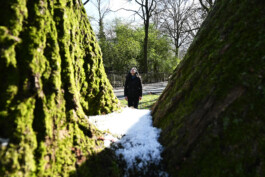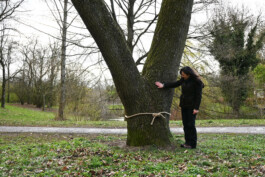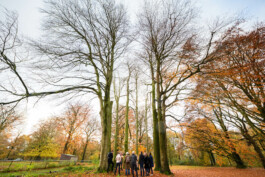Place of Residency
Ald Weishoès, Venlo
*1981 in Groenlo (NL). Workstudio and residence in Harfsen (NL). Educated in fine art (2006) followed by a master's degree in art education (2021). Her work includes installations in combination with audio experiences and performance art. Her working method in particular is characteristic of her art practice.

Thorough (artistic) research forms the basis of her work. Visitors and passers-by regularly transform into participants.
She made the podcast 'HelloPlant' (2021) and workshop 'How to Be With Plants' (2021) for ArtEZ studium Generale. Next to this she laid the foundation for Eenwoud (2021), in which the descendants of trees try to survive together for the upcoming 1000 years. She showed her work during the IJsselbiënnale (2017), and was one of the artists who participated in the research project CALL of the museum van Bommel van Dam about farmers in North Limburg (2019) and Natural Farm Lab from Province Overijssel, Kunstenlab and AgriMeetsDesign ( 2017).
Discipline
Fine art and artist educator

In her work, Lobke Meekes prefers to dive into unknown worlds. She is inspired by social issues and landscapes. The 'other', both human and plant, has her interest.
She wants to build stories about the way we live our lives and live together in which visitors become participants. These stories, in the form of an installation or performance, work like a mirror. Participants are invited to participate in this set in order to reflect on their own role in the whole. With these physical experiences, Lobke strives for an experience that is perceived in and throughout the body.
Her working method is characterized by a mix of web searches, literature research, conversations and interviews, interspersed with artistic research (see artistic research) and therefore fits well with the desire to identify opportunities and try out methods.
An example of this artistic research is the Baarhuisje project, in which she asked participants to lay out a fallen piece of tree (such as a blossom, leaf, twig or piece of bark) in the first ever storage house for plants, and to write and draw a farewell cards in memory of the plant particles. For 3 months, the collection in the chapel grew into a rich and colorful collection of plant findings and reflections on the relationship between people and plants.
Year of participation
2021
For the New Perspectives project, Lobke is linked to the Old Weishoès in Venlo. This characteristic building with a rich history served as an orphanage and elderly home. It is currently in the pipeline to return as a hostel, student residence and practice and meeting space for clubs in the area. New Perspectives is aimed at developing new ways of integrating nature into our immediate living environment. An interesting challenge for this location in the 'petrified' environment in the center of the city. How do plants and trees fit in a busy city center? And is it possible to embrace these green earthlings as new inhabitants of the city of Venlo instead of seeing them as a green backdrop? How is Lobke involving residents, visitors or entrepreneurs in the new nature in their environment? »I start by mapping emotions experienced in relation to plant nature. I do this by creating artistic interventions, with which I collect 'data' as a starting point to develop new work that might inspire or raise new questions for the future.«

Website

Place of Residency
Ald Weishoès, Venlo
*1981 in Groenlo (NL). Workstudio and residence in Harfsen (NL). Educated in fine art (2006) followed by a master's degree in art education (2021). Her work includes installations in combination with audio experiences and performance art. Her working method in particular is characteristic of her art practice.
Thorough (artistic) research forms the basis of her work. Visitors and passers-by regularly transform into participants.
She made the podcast 'HelloPlant' (2021) and workshop 'How to Be With Plants' (2021) for ArtEZ studium Generale. Next to this she laid the foundation for Eenwoud (2021), in which the descendants of trees try to survive together for the upcoming 1000 years. She showed her work during the IJsselbiënnale (2017), and was one of the artists who participated in the research project CALL of the museum van Bommel van Dam about farmers in North Limburg (2019) and Natural Farm Lab from Province Overijssel, Kunstenlab and AgriMeetsDesign ( 2017).

Discipline
Fine art and artist educator
In her work, Lobke Meekes prefers to dive into unknown worlds. She is inspired by social issues and landscapes. The 'other', both human and plant, has her interest.
She wants to build stories about the way we live our lives and live together in which visitors become participants. These stories, in the form of an installation or performance, work like a mirror. Participants are invited to participate in this set in order to reflect on their own role in the whole. With these physical experiences, Lobke strives for an experience that is perceived in and throughout the body.
Her working method is characterized by a mix of web searches, literature research, conversations and interviews, interspersed with artistic research (see artistic research) and therefore fits well with the desire to identify opportunities and try out methods.
An example of this artistic research is the Baarhuisje project, in which she asked participants to lay out a fallen piece of tree (such as a blossom, leaf, twig or piece of bark) in the first ever storage house for plants, and to write and draw a farewell cards in memory of the plant particles. For 3 months, the collection in the chapel grew into a rich and colorful collection of plant findings and reflections on the relationship between people and plants.

Year of participation
2021
For the New Perspectives project, Lobke is linked to the Old Weishoès in Venlo. This characteristic building with a rich history served as an orphanage and elderly home. It is currently in the pipeline to return as a hostel, student residence and practice and meeting space for clubs in the area. New Perspectives is aimed at developing new ways of integrating nature into our immediate living environment. An interesting challenge for this location in the 'petrified' environment in the center of the city. How do plants and trees fit in a busy city center? And is it possible to embrace these green earthlings as new inhabitants of the city of Venlo instead of seeing them as a green backdrop? How is Lobke involving residents, visitors or entrepreneurs in the new nature in their environment? »I start by mapping emotions experienced in relation to plant nature. I do this by creating artistic interventions, with which I collect 'data' as a starting point to develop new work that might inspire or raise new questions for the future.«